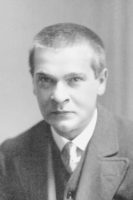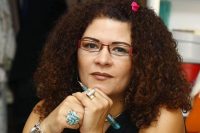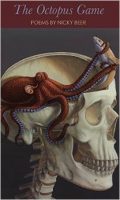February 3, 2015
Edited by David Sanders
Specimen Days
1602 – Paul Melissus, [Paul Schede], German poet/composer, dies at 62.
1832 – George Crabbe, English vicar/poet (Borough), dies at 77.
1842 – Sidney Clopton Lanier, US, composer/poet (Hall of Fame), is born.
1870 – Ada Negri, Italian poet/author (Il Libro di Mara), is born.
1887 – Georg Trakl, Austrian poet (Autumn of the Lonely), is born.
1909 – M Vasalis [Margaretha Droogleever Fortuyn-Leenmans], poet (Phoenix), is born.
1947 – Paul Auster, US author/poet/director (Mr Vertigo, Smoke), is born.

Winter Evening
When snow falls against the window,
Long sounds the evening bell…
For so many has the table
Been prepared, the house set in order.
From their wandering, many
Come on dark paths to this gateway.
The tree of grace is flowering in gold
Out of the cool sap of the earth.
In stillness, wanderer, step in:
Grief has worn the threshold into stone.
But see: in pure light, glowing
There on the table: bread and wine.
—Georg Trakl (1887–1914)
“In stillness, wanderer, step in: / Grief has worn the threshold into stone.” – Georg Trakl
World Poetry
Two Television Shows, One Goal – to Revive Arabic Poetry

Sultan Al Ameemi is the editor-in-chief of Million’s Poet magazine, a monthly publication on poetry, literature and cultural heritage. He is also associated with two television poetry competitions that are broadcast on Abu Dhabi TV – as a judge on Million’s Poet and as a member of the higher committee for the Prince of Poets. There is one distinct difference between the two TV programmes: the form of Arabic used. Million’s Poet was created to revive poetry that is recited in the ancient Nabati, or Bedu dialect, which also includes the Mwal, Shalla and Qalta dialects and is more than 1,000 years old. Prince of Poets showcases poetry written in classical Arabic.
Egyptian Poet Goes on Trial Accused of Contempt of Islam

A prominent Egyptian poet could face up to three years in jail over a Facebook post in which she criticized the slaughter of animals at a Muslim festival, a case which rights activists say shows how the government is muzzling free speech. Fatima Naoot described the Prophet Abraham's dream – in which, according to Islamic belief, God tells him to sacrifice his son as a test of his faith – as a "nightmare".
Abu Dhabi TV broadcasts two television poetry competitions: Prince of Poets and Million’s Poet.
Recent Reviews
‘Ideas of Order,’ by Neil L. Rudenstine
by Glyn Maxwell
Time has formed its judgment on the 154 poems that make up what we call “Shakespeare’s sonnets.” Most are known to some and some are known to all. Eight or 10 are probably here for as long as we are, two or three perhaps longer, lighting out for deep space in binary code, beyond praise or burial. Any critical word a living poet might say about them now would necessitate the wearing of a jester’s motley — with first-person “I” as one’s little stick to shake — so excuse me while I don this costume, leaf haplessly hither and thither through all 154 and cry that I would take the least of the plays over the whole blooming thing.
The Fame of Derek Walcott
by David Mason
Seamus Heaney once sent me a postcard from St. Lucia, beginning, “Well, it’s one thing to feature with a Beowulf helmet in a Mason article. It’s something else to be on the national stamps.” The twenty-cent stamp in question bore the visage of his close friend and fellow Nobel laureate, Derek Walcott. “See 65c also,” Seamus wrote—the larger denomination celebrated the tenth anniversary of Walcott’s prize. Not that Seamus was any less famous, mind you, but he had a good sense of humor about it: “I’ve the whitest paunch on the island—but drink the rummiest punch.” The insouciance belied a lifetime of staggering labor on the part of both poets.
Poetic Voice Wrapped Tight in Its Shifting Politics
by Dwight Garner
There are two ways to rank writers, the poet John Berryman said, “in terms of gift and in terms of achievement.” Amiri Baraka (1934-2014) had a bold gift. His best poems are cynical, impolite, acid in their wit’s rain. He tapped easily into the suspicion and resentment that linger below the promise of American life. He was the keeper of a certain vinegary portion of the African-American imagination. He declared, over and over, that he would not be fooled again.
‘Slant Six’ by Erin Belieu and ‘Barely Composed’ by Alice Fulton
by Michael Andor Brodeur
Clarity and poetry aren’t always the closest companions. Sometimes directness can feel like a fundamental betrayal of poetry’s sublime encryption, ringing out in violation of a poem’s “indoor voice” policies. And more often than not, it’s presumed the province of prose by those poetry readers who prefer a little guesswork to season their certainties.
So when Erin Belieu writes “America, it’s time/ to unsuck those bellies/ and show our ugly asses,” as she does in “H. Res. 21-1: Proposing the Ban of Push-Up Bras, Etc.,” you may feel the momentary discomfort of a passenger being abruptly, directly addressed by another passenger. Throughout her fourth collection, “Slant Six,” there runs a sense that all of us are aboard the same ride, driven (perhaps by the titular engine) to the same destination. And there’s an urgency to Belieu’s confidence in our listening.
Amiri Baraka had a bold gift and wrote poems that tap into the suspicion that lingers below the promise of American life.
Broadsides
Reading the Americans: Apart and Together
by Jeffrey Wainwright
That there is a lout in Walt Whitman, as C. H. Sisson asserts (Parnassus, Spring/Summer 1978) is something few of his admirers would deny. The loiterer, the loafer, the awkward fellow, strolls through Song of Myself and much of his work, most notoriously sniffing his own armpits and generally displaying a crudity which, as Ezra Pound said, 'is an exceeding great stench'. This character is, as we say in England, all mouth. But there are other characters called Walt Whitman in that poetry. For ever identifying and expanding into other experience, there are yet moments of acute self-consciousness and an awareness of almost culpable detachment. 'I witness the corpse with its dabbled hair, I note where the pistol has fallen.' The adjective 'dabbled' with its suggestion of damp and of being messed with, is an instance of poetic precision not often enough associated with Whitman, though the reader's admiration of such delineation is at once questioned by the police-like impersonality of the evidential 'witness' and 'note'.
Fluency, Fractures, and Fabrication in Cathy Park Hong
by AK Afferez
In Cathy Park Hong’s second poetry collection, Dance Dance Revolution, the character of the Historian describes the complex and ever-shifting layers that make up the language of the Desert, a town that harkens back to Las Vegas in a world that feels post-apocalyptic. The Historian writes in our English, with familiar grammar, vocabulary, and spelling, and transcribes (and sometimes translates) phonetically the variant of the Desert language spoken by the Guide, who converses with tourists, migrants, and other civilians every day. Each character uses their intimate knowledge of the language—their fluency—in their own singular way.
Cathy Park Hong’s second collection, “Dance Dance Revolution”, takes place in a world that feels post-apocalyptic.
Drafts & Fragments
This Website Will Turn Your Tweets Into Poetry
by Taylor Lorenz
Enter your Twitter handle into Poetweet and the website will transform your tweets into the poetry you always knew they were. Once you sign in, Poetweet gives you the option of transforming your 140-character missives into three types of poems: a sonnet (popularized by Shakespeare), rondel (French lyric poetry), or indriso (a format created by Spanish poet Isidro Iturat).
29 January (1958): Elizabeth Bishop to Robert Lowell
Here, Elizabeth Bishop writes to her close friend and fellow poet Robert Lowell about his recent poems, Anton Webern’s compositions, and the “strange kind of modesty” she finds in all contemporary works that she admires. Bishop also describes her temporary living situation with her near-nephew Flávio, and her life in Petrópolis, Brazil, where she lived with her partner Lota de Macedo Soares.
There’s now a website that will turn your tweets into sonnets: Poetweet.
Poetry In the News
Shortlist Announced for Ireland’s Best Loved Poem

Patrick Kavanagh’s timeless "A Christmas Childhood," William Butler Yeats’s "Easter 1916" and Paul Durcan’s "Making Love Outside Áras an Uachtaráin" have been chosen as among Ireland’s best loved poems of the last 100 years. A shortlist of 10 has been chosen by an independent jury from public nominations received as part of the RTÉ A Poem For Ireland project.
Nathaniel Mackey wins Yale’s 2015 Bollingen Prize for Poetry

Nathaniel Mackey has been named the winner of Yale’s 2015 Bollingen Prize for American Poetry, joining a list of past winners that includes such luminaries as Ezra Pound, Wallace Stevens, E.E. Cummings, and Marianne Moore. “I’m thrilled to learn that I've been awarded the Bollingen Prize,” Mackey says. “Joining so distinguished a group of recipients makes it especially moving. I’m deeply honored by the recognition and endorsement the award represents.
Patrick Kavanagh, William Bulter Yeats, & Paul Durcan are all in the running for Ireland’s best loved poem.
New Books
cadabra by Dan Rosenberg
[Paperback] Carnegie Mellon, 72 pp., $15.95

In this striking collection, the world is offered up in miniature, each poem torqued with the energy of doves trapped in a top hat. With these snapshot poems, Rosenberg reminds us that to face the beloved is to disappear. The taut lyrics of this book suggest a self-interrogation that is at the same time an investigation into our culture at large.
Testimony by Charles Reznikoff
[Paperback] Black Sparrow Press, 480 pp., $24.95
Available again for the first time since 1978-and complete in one volume for the first time ever- Charles Reznikoff's Testimony is a lost masterpiece, a legendary book that stands alongside Louis Zukofsky's "A" and William Carlos Williams's Paterson as a milestone of modern American poetry. Taking as its raw material the voices of witnesses, victims, and perpetrators discovered by the author in criminal court transcripts, Reznikoff's book sets forth a stark panorama of late- 19th- and early 20th-century America-the underside of the Gilded Age, beset by racism and casual violence, poverty and disease-in a radically stripped-down language of almost unbearable intensity. This edition also includes Reznikoff 's prose studies for the poem, unavailable to readers since the 1930s, and a new introduction by essayist Eliot Weinberger.
The Octopus Game by Nicky Beerz
[Paperback] Carnegie Mellon, 80 pp., $15.95

Highly intelligent and a master of camouflage, the octopus is a creature destined to thrive in the poetic ecosystem. In The Octopus Game, the figure of the octopus shape-shifts and reinvents itself throughout ocean depths, tide pools, aquariums, gardens, movies, pulp novels, fine art, and nightmares. Nicky Beer acts as the strange documentarian recording the bizarre, beautiful, and disturbing habits of creatures for whom subterfuge and mimicry are a means of survival.
The Do-Over by Kathleen Ossip
[Paperback] Sarabande Books, 96 pp., $14.95
“How do you stay in heaven?” Ossip asks, “Is it a kind of sophisticated rewind?” Her third collection of poems is haunted by the idea of ‘rewind,’ and especially by the teasing possibility that we, too–like the moon, like a plant–may be granted cycles of life, death, and rebirth. The book's overarching narrative is the death of the poet’s stepmother-in-law, a cherished, loving, eccentric woman who returns to its pages again and again. But in spite of its focused grief and ontological urgency, The Do-Over is a varied collection–short acrostics mourn recently dead cultural icons (Amy Winehouse, Steve Jobs, Donna Summer); there's an ode to an anonymous Chinese factory worker, three “true stories” that read like anecdotes told over drinks, and more. The Do-Over is an unsentimental elegy to a mother figure, a fragmented portrait of its difficult, much loved subject. It's also a snapshot of our death-obsessed, death-denying cultural moment, which in Ossip's gifted hands turns out to be tremulous, skeptical, unsure of ultimate values and, increasingly, driven to find them.
Barely Composed: Poems by Alice Fulton
[Hardcover] W. W. Norton & Company, 112 pp., $25.95

In this eagerly awaited collection of new poems—her first in over a decade—Alice Fulton reimagines the great lyric subjects—time, death, love—and imbues them with fresh urgency and depth. Barely Composed unveils the emotional devastations that follow trauma or grief—extreme states that threaten psyche and language with disintegration. With rare originality, the poems illuminate the deepest suffering and its aftermath of hypervigilance and numbness, the "formal feeling" described by Emily Dickinson.
In Dan Rosenberg’s striking collection “cadabra” the world is offered up in miniature.
Correspondences
Shedding No Tears: Mark Doty Talks about What Makes a Good Poem
by Brian Bieganski

The first American to win England's prestigious T.S. Eliot prize, Mark Doty will be switching gears from being judged to judging. The award-winning poet and author has been selected as the national judge for the 47th Annual Dyer-Ives Poetry Contest, which is currently accepting entries for this year's competition. As a poet, there are a few things that Doty looks for in a poem. "[I look for] language that kicks at the feelings."
The Costa Book of the Year Contender Bringing Poetry to Class
Susanna Rustin

When Jonathan Edwards was a schoolboy in south Wales, his primary teacher dressed the class in rags, smeared dirt on their faces, and took them on a re-enactment of the Chartist march of 1839. The Newport Rising began at the Welsh Oak pub in Pontymister and ended when 22 protesters, marching for the right to vote, were shot. “Looking back, I think that was a really important day,” says Edwards, 35 and a teacher himself. He included a poem about Newport’s Chartist mural in his first book. The mural was controversially demolished in 2013 but the book won this month’s Costa poetry award.
Hero Status: Dorothea Lasky
by Eileen Myles
Dorothea, aka “Dottie,” Lasky is 36. Rome is her fourth book, and she has been writing all her life. To write about Dottie, I have to mention an enraging thing I love thinking about. Which is that to write poetry and be a poet is to get bombarded with stupidity like you’re invited to be on panels with titles like does poetry matter or you read someone in the New York Times or the Atlantic Monthly saying they really don’t think ANYONE READS POETRY. Ugh. And of course as a poet you have to react. It’s like being female and listening forever to people say dumb things about who women are and you wonder if you will ever get to simply be. Because you are sick of unloading the culture’s negativity time & time again. Nobody ever goes do we need comedians? Aren’t clowns out of date. What about music? Who listens to music anymore? And then a poet comes along who is able to stick a pin in the whole thing. Dorothea Lasky is that poet right now.
What Mark Doty looks for in a poem: “language that kicks at the feelings.”
Envoi: Editor’s Notes
How the Best-selling Poet Gets Forgotten
by Helena Nelson
The poem-novel that made her, as they say, ‘a household name’ went into eleven editions between September 16 and December 12, 1940 in the United States. Within four years it had sold nearly seven hundred thousand copies, more than half of these in the UK. A 27-minute reading of the work, with orchestral accompaniment, was recorded by movie star Lynn Fontanne and broadcast on US national radio—then broadcast again – due to popular demand. A third broadcast in western Canada was followed by a Canadian concert performance. During one of the rehearsals, the first violinist ‘laid his bow on the stand in front of him, covered his face with his hands, and burst into tears.’ No, I haven’t mentioned the author’s name yet. Nor the work. She is no longer household name. She is rarely mentioned at all, though she can be found on the net, mainly in places and formats that do her no favours. The literary waters that protect poetry from the masses have closed over her head.
______________________________________________________________________

What happens to best-selling poets after they sell?